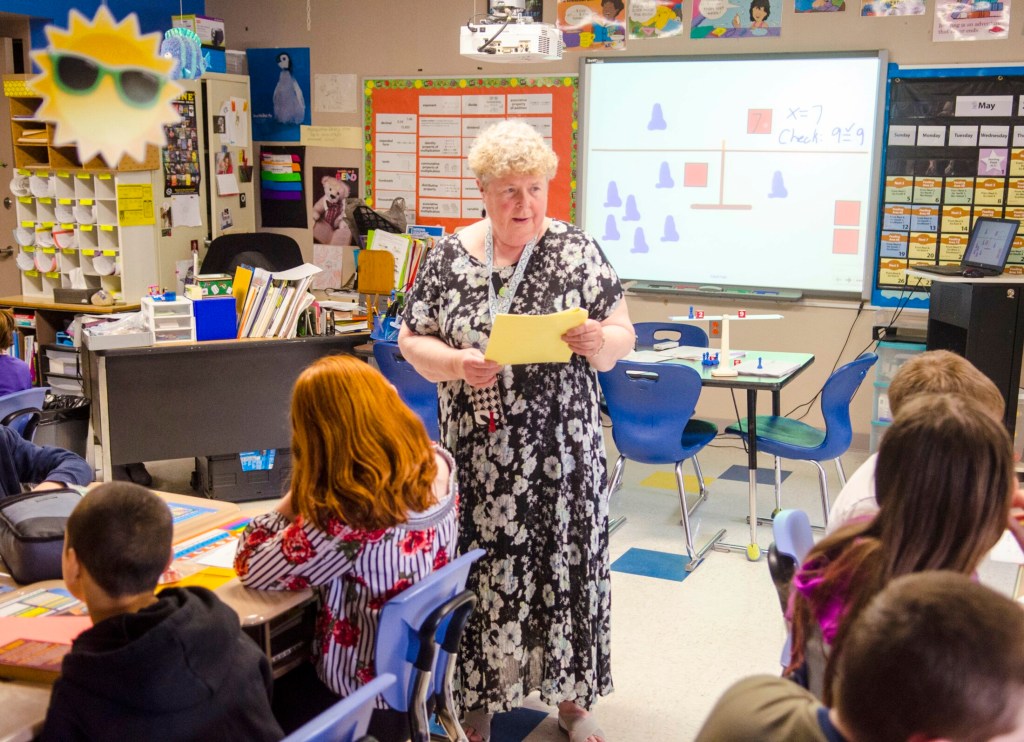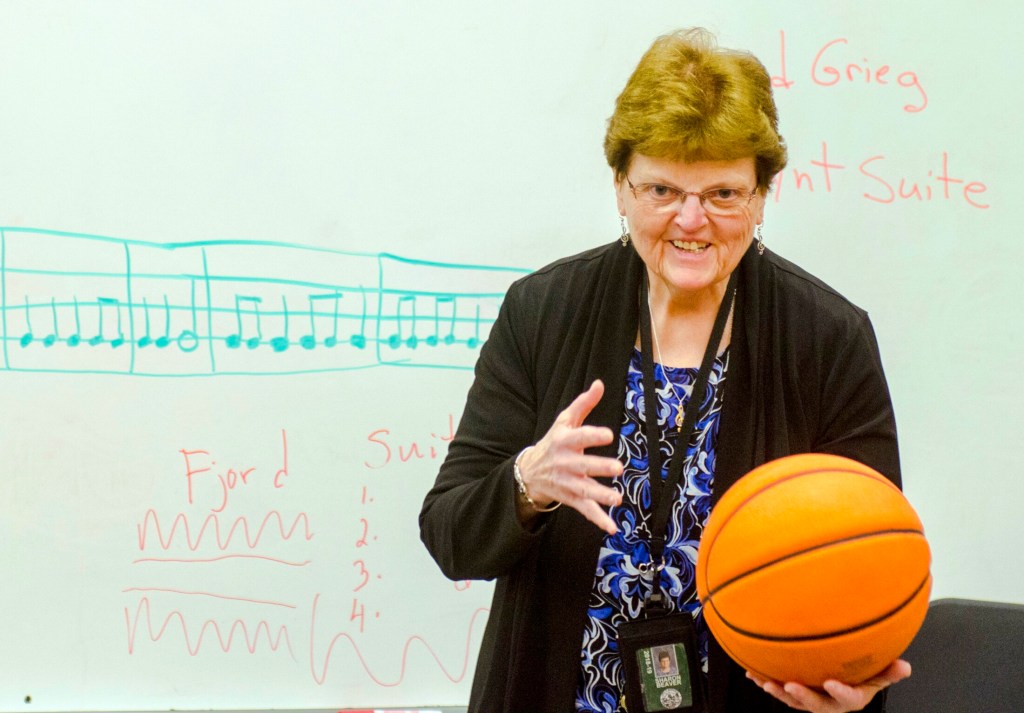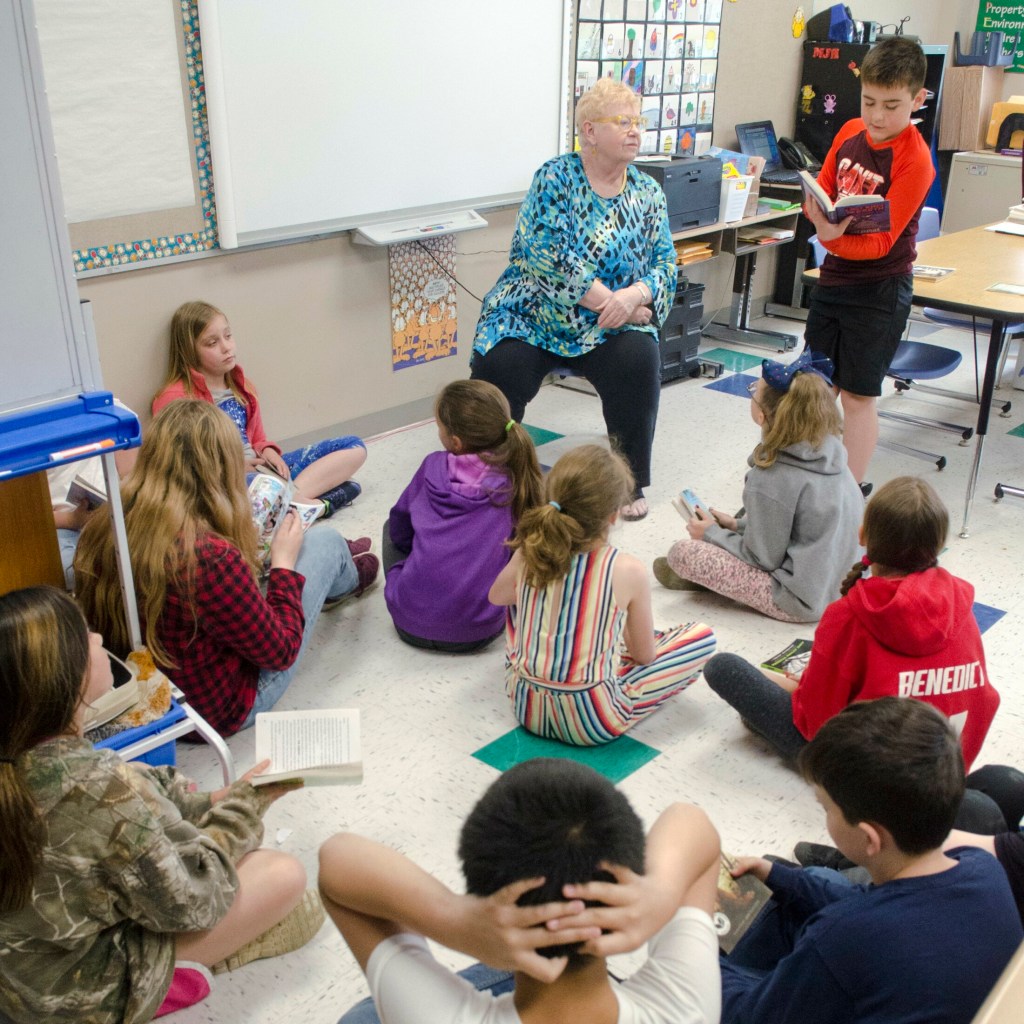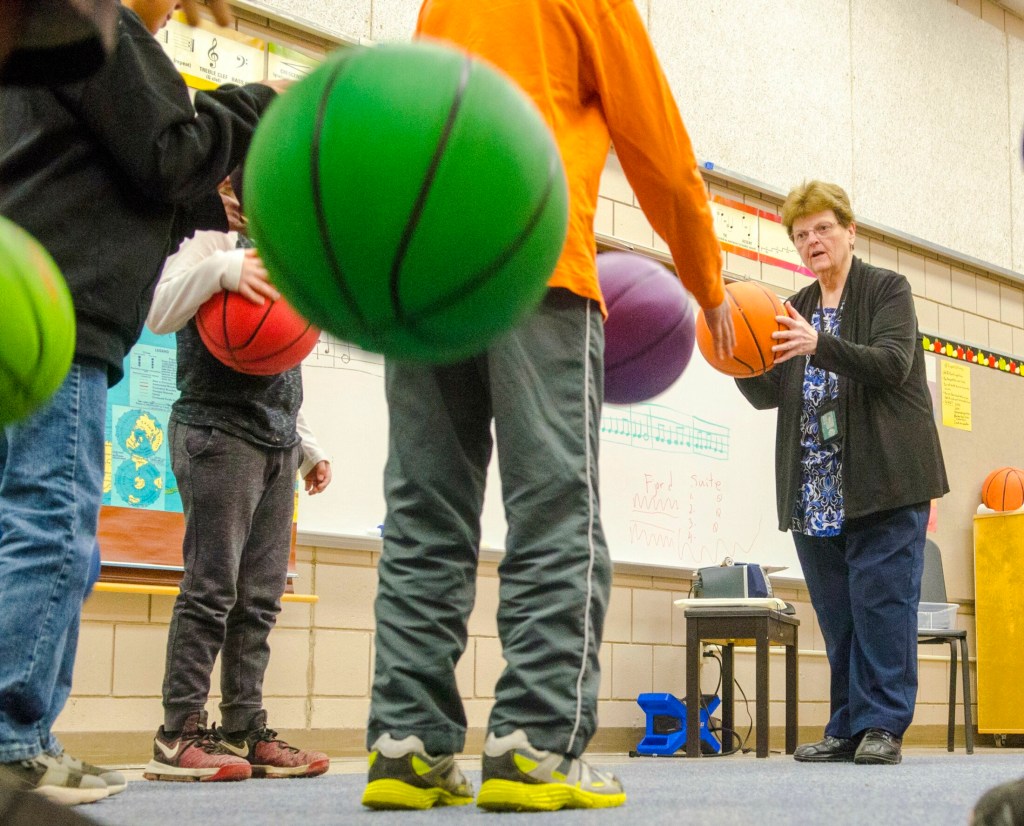AUGUSTA — Three friends with nearly 150 years in teaching among them, most of it at Farrington Elementary School, will retire together at the end of this school year.
Fifth-grade teacher Elizabeth Chadwick, who has taught for the last 47 years and attended the old Farrington Elementary School herself, as did her father, is retiring with her longtime colleagues Marcia Hughes, who has taught fourth grade all of her 48 years in teaching, and Sharon Beaver, a music teacher for 46 years.
All three said they stayed in the profession so long for one major reason — the kids.
“I always knew I wanted to teach. I played school from the time I was a little girl,” Hughes said. “You get to have these special relationships with kids. You’re their mom for the day.”

Fifth-grade teacher Liz Chadwick, top, works with Abdulrahman Abdalnabi on Thursday at Farrington Elementary School in Augusta. Kennebec Journal photo by Joe Phelan
Beaver, who teaches music at both Farrington and Hussey Elementary School and also has taught at other elementary schools in Augusta, said she always has considered Farrington to be home. She said a former principal of the school once told her, “You belong at Farrington. You’re one of us.” It’s a message she passes on to her incoming students, that they belong.
Chadwick, who majored in American history education in college, initially wanted to teach high school history, but there were no openings at that level when she first became a teacher. She taught for one year at the former Hodgkins Middle School. Then when a fifth-grade position opened at Farrington, she took it, and has held it ever since, including a stint when she served as a teaching principal. She said she’s stuck to the same grade because she enjoys children at that age, when they are both independent and nice. She said there have been trying times over the years, but she’s never wanted to leave Farrington. And she can’t think of anything else she’d rather have done than be a teacher.
“We’re a family and we take care of each other,” Chadwick said, prompting an “Amen,” from Hughes.
Fourth-grade teacher Jessica Walling said the group’s retirement will leave a huge hole in the school district and they will be dearly missed. She said they’ve undergone thousands of hours of professional development and share their knowledge with new teachers, mentor and encourage other teachers when they feel overwhelmed, and attend all after-school functions to show their support for their students and their families.
“It’s rare, especially today, to find such dedication, selflessness and an old-fashioned community connection,” Walling said of the trio of retiring teachers. “They arrive long before most, 6 a.m. sharp, leave long after everyone else has gone home and often work weekends. They can manage a classroom of 20-plus diverse learners and make each one feel extra special and accomplished.”
That in-classroom diversity among their students is something the teachers said they enjoy, and is a benefit to all students. Farrington Elementary School is home to both some districtwide special education programs and students in the English language learners program, which has many students who are new to this country and need assistance learning English.
The three teachers said that type of diversity is not new to Farrington, where decades ago immigrants from other countries, including Cambodia and Vietnam, went to school shortly after arriving in this country.
“I like the fact we have so many kids of different cultures. That’s enriching for us and them,” Hughes said. “That’s kind of wonderful.”

Fourth-grade teacher Marcia Hughes shows her class a picture Thursday as she reads aloud from a book at Farrington Elementary School in Augusta. Kennebec Journal photo by Joe Phelan
When they first started teaching, special education students often were kept isolated and separate from the rest of their schoolmates; but now they are much more integrated, which they said is an improvement and also beneficial to all students.
Hughes said by interacting with special education students personally, other students can see that people who are different from them are also alike in many ways, and it is fun to spend time with them, as with any other student.
The three are also friends away from school. Hughes and Beaver share a home in Augusta; while Chadwick, who lives in the home she grew up in, also lives nearby. For part of the summer they rent a cottage together in Pemaquid. They also talked about retiring and decided to do that together, too.
Chadwick and Hughes, teaching fourth and fifth grades in the same school together for so long, joke that Hughes starts ruining the students and Chadwick finishes it off. It’s clear they’re joking and that they form strong attachments to their students, many of whom come to visit them as adults or run into them around Augusta. Once they were out together in an Augusta restaurant when a now-adult former student came up to them and sang every word of a song she’d learned from Beaver in third grade.
“Those are the things you treasure. You can’t hold it in your hand; you hold it in your heart,” Hughes said.
Each of them has taught the children of parents whom they also had as students, many years earlier.
One of Beaver’s former students, Troy Alexander, is now principal of Hussey Elementary School in Augusta.
Beaver said she’s enjoyed teaching at the elementary school level where, she said, “you’re laying the foundation and they build on that.”
The hardest part of being a teacher, Chadwick said, is seeing kids who can’t function well because of things going on in their lives, and wanting to help them but only being able to do so much.
She also said the increasing burden of paperwork and testing has made it harder to teach students effectively. She said the number of hours in the school day hasn’t changed, but so much more of it is taken up by testing. She said there used to be enough time to touch on every subject during one school day and still have time for “fun stuff” such as playing kickball or working on art projects. She said students back then seemed to do just as well without the additional testing of today, going on to successful careers and contributing to their communities.
All three said they’d recommend a career in teaching, but only for someone who cares about children, not money.
Send questions/comments to the editors.







Success. Please wait for the page to reload. If the page does not reload within 5 seconds, please refresh the page.
Enter your email and password to access comments.
Hi, to comment on stories you must . This profile is in addition to your subscription and website login.
Already have a commenting profile? .
Invalid username/password.
Please check your email to confirm and complete your registration.
Only subscribers are eligible to post comments. Please subscribe or login first for digital access. Here’s why.
Use the form below to reset your password. When you've submitted your account email, we will send an email with a reset code.